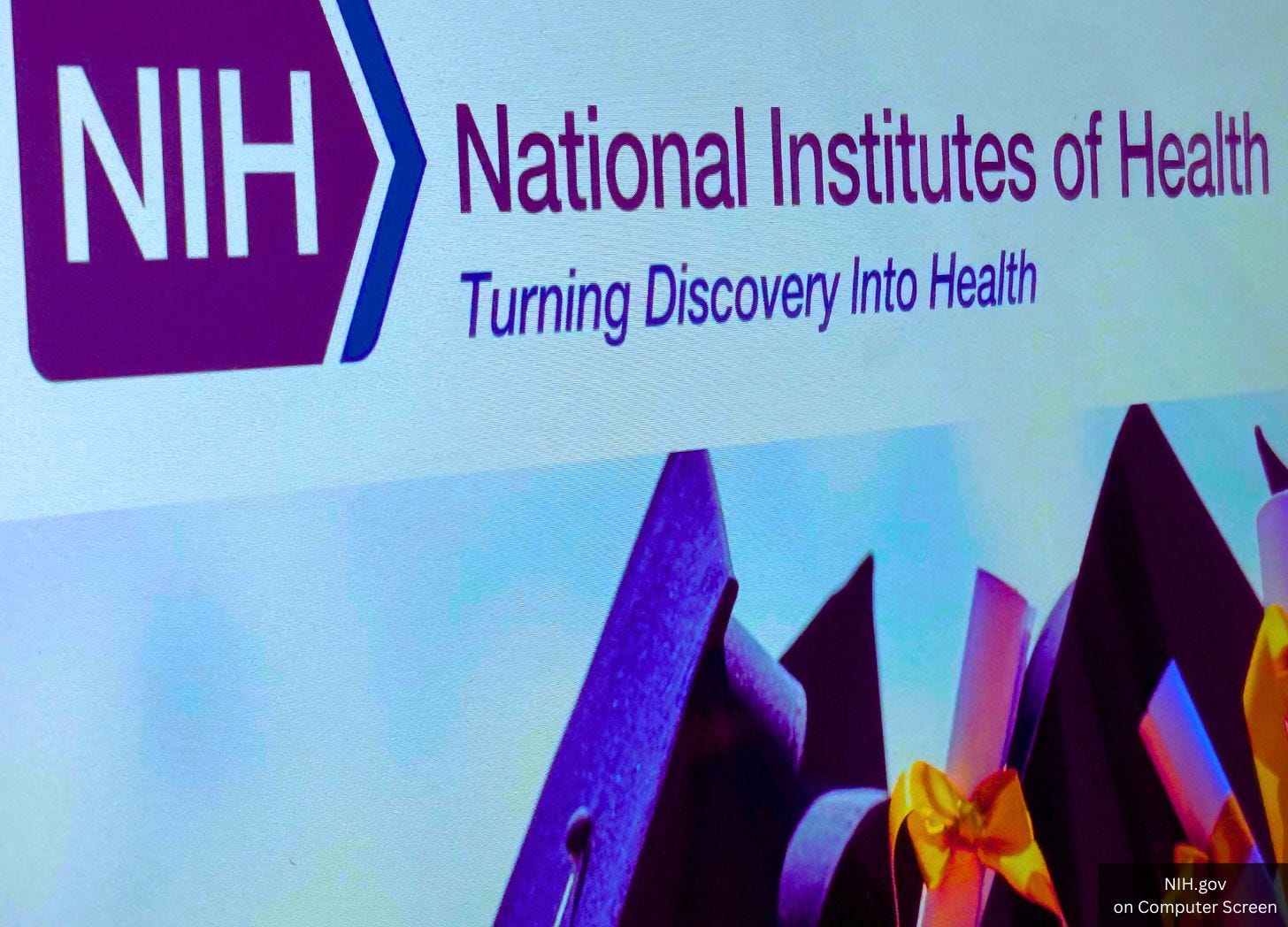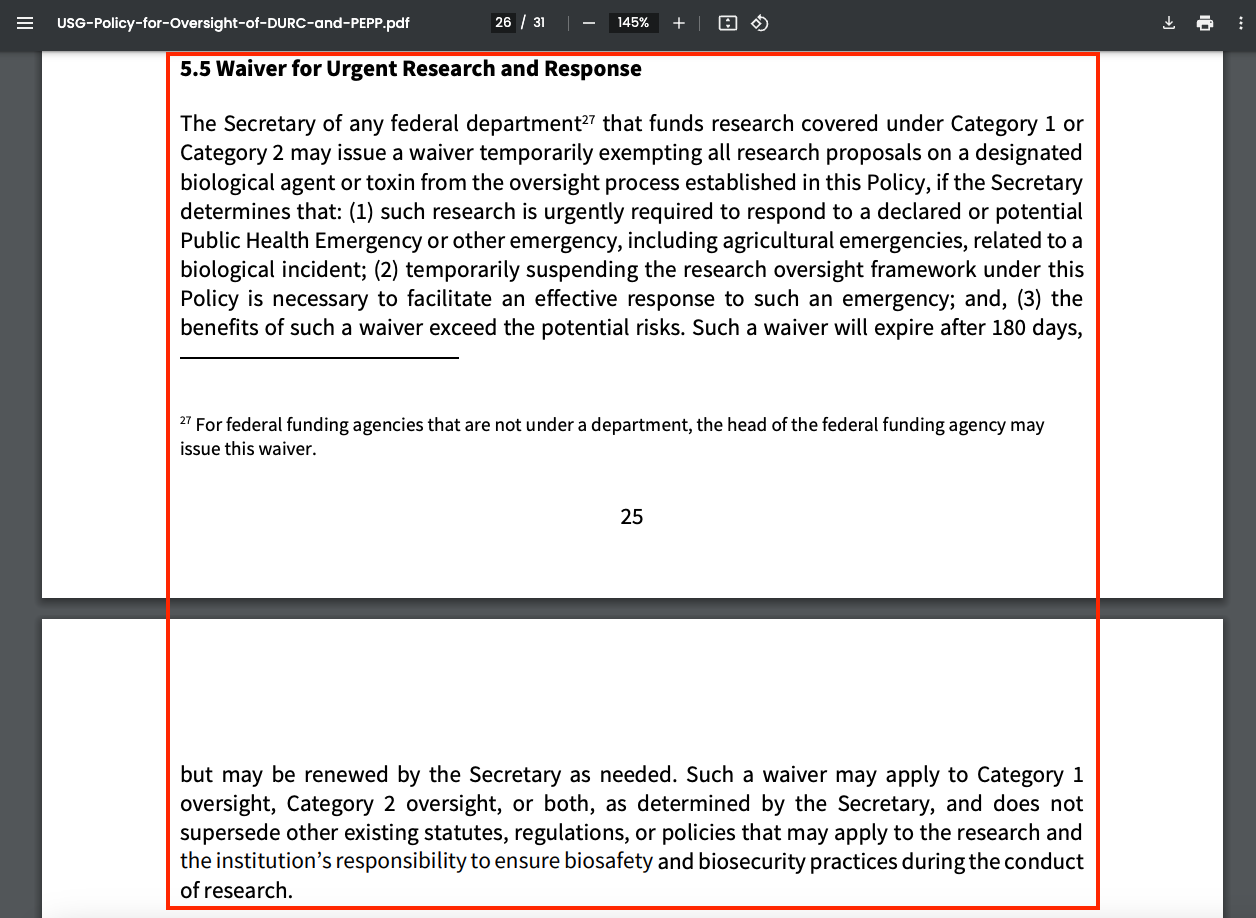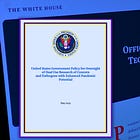Fine Print of NIH's Gain-of-Function Update Shows Dangerous Pathogen Research Still Allowed
NIH still "accepting requests for exceptions to terminations or suspensions."
The National Institutes of Health this week issued a notice on “dangerous gain-of-function” research following President Trump’s May 5, 2025 executive order, but the fine print of the announcement shows that dangerous pathogen experiments are not banned outright and that exceptions remain.
The congressional Select Subcommittee on the Coronavirus Pandemic concluded that “[a] lab-related incident involving gain-of-function research is most likely the origin of COVID-19,” raising concerns that ongoing gain-of-function experiments could trigger another pandemic.
The NIH’s new policy, issued Wednesday, is titled: “Implementation Update: Terminating or Suspending Dangerous Gain-of-Function Research in Accordance with the Executive Order on Improving the Safety and Security of Biological Research.”
Follow us on Instagram @realjonfleetwood & Twitter/X @JonMFleetwood.
If you value this reporting, consider upgrading to a paid subscription.
Exceptions Remain for Dangerous Gain-of-Function
Both the executive order and the NIH announcement allow exceptions.
The executive order states: “Heads of agencies shall report any exception to a suspension to the Director of OSTP for review in consultation with the APNSA and the heads of relevant agencies.”
The new NIH announcement also states: “NIH will not be accepting requests for exceptions to terminations or suspensions,” but only “if deemed to meet the Executive Order’s definition of dangerous gain-of-function research.”
The key phrase “if deemed” leaves the decision entirely with NIH staff.
Any project not “deemed” dangerous apparently may continue.
Some U.S. Gain-of-Function Research Only ‘Suspended’
The NIH announcement confirms that U.S.-based gain-of-function research is not permanently stopped.
It states: “NIH will: Terminate funding and other support for projects... meeting the definition of dangerous gain-of-function research conducted by foreign entities in countries of concern or foreign countries where there is not adequate oversight; and Suspend all other funding and other support for projects... meeting the definition of dangerous gain-of-function research at least until implementation of the new policy described in Section 4(a) of the Executive Order.”
New Policy Being Written
The NIH further writes: “NIH is actively engaging with its federal agency and White House partners to implement the Executive Order and develop an improved policy for oversight of this research.”
That means NIH and other agencies are currently drafting a new policy that could restore even more dangerous gain-of-function work.
Broad Definition Narrowed to ‘Covered Activities’
In defining what types of experiments fall under the new restrictions, the NIH notice states that “dangerous gain-of-function research means scientific research on an infectious agent or toxin with the potential to cause disease by enhancing its pathogenicity or increasing its transmissibility.”
But this definition is then limited to “covered research activities,” meaning experiments “that could result in significant societal consequences and that seek or achieve one or more of” seven listed outcomes.
The language allows room for interpretation of what is considered “significant.”
OSTP Waiver Rule Still Active
The separate waiver rule issued by the White House Office of Science and Technology Policy last year and which took effect last month, allowing high-risk experiments to bypass independent review, apparently remains in effect.
That rule states: “The Secretary of any federal department that funds research... may issue a waiver temporarily exempting all research proposals on a designated biological agent or toxin from the oversight process,” with the option for indefinite renewals.
Sen. Paul Warns of Bird Flu Experiments
Senator Rand Paul (R-KY) last month said NIH had funded “research to mutate the avian flu to make it more transmissible through the air and among mammals.”
“This is very, very dangerous research,” Sen. Paul said in a Newsmax interview, warning of the pandemic risk if such a pathogen escapes the lab.
“If we have a virus that leaks, that has 50% mortality, we’re talking about billions of people dying,” the Kentucky senator said. “We’re talking about a planetary epidemic that could set us back centuries and cause violence and chaos and war throughout the entire planet. So we should not be funding research to make avian flu more transmissible. It’s a death wish.”
The warning comes as the Trump administration launches a $500 million “next-generation” vaccine initiative targeting bird flu, the same virus the government has been enhancing in labs through gain-of-function research.
The U.S. government is orchestrating both the problem and the solution regarding a potential future bird flu pandemic.
Just like it did with COVID-19.
Dangerous Research Can Still Be Approved
Despite public claims that Trump’s executive order bans gain-of-function research, the fine print shows otherwise.
Dangerous experiments can still be approved under exception rules.
Waivers remain available.
And federal officials are already working on a new policy that could restore these practices, all while the administration’s bird flu preparedness programs continue to expand.
Follow us on Instagram @realjonfleetwood & Twitter/X @JonMFleetwood.
If you value this reporting, consider upgrading to a paid subscription.
For advertising & sponsorship opportunities reaching 230,000+ monthly viewers, contact us by clicking below.















Yep. They still want kill us.
GOF research is OK as long as it's not "dangerous". Of course, if the research IS deemed dangerous by the Psychopathy, then an "exception" perrmission slip will be quickly granted.
I feel so much safer.